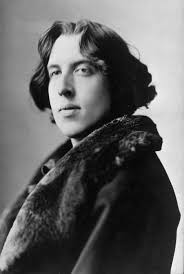The Picture of Dorian Gray Page #35
The Picture of Dorian Gray is a Gothic and philosophical novel by Oscar Wilde, first published complete in the July 1890 issue of Lippincott's Monthly Magazine. Fearing the story was indecent, prior to publication the magazine's editor deleted roughly five hundred words without Wilde's knowledge.
No; that was impossible. Hour by hour, and week by week, the thing upon the canvas was growing old. It might escape the hideousness of sin, but the hideousness of age was in store for it. The cheeks would become hollow or flaccid. Yellow crow's feet would creep round the fading eyes and make them horrible. The hair would lose its brightness, the mouth would gape or droop, would be foolish or gross, as the mouths of old men are. There would be the wrinkled throat, the cold, blue-veined hands, the twisted body, that he remembered in the grandfather who had been so stern to him in his boyhood. The picture had to be concealed. There was no help for it. "Bring it in, Mr. Hubbard, please," he said, wearily, turning round. "I am sorry I kept you so long. I was thinking of something else." "Always glad to have a rest, Mr. Gray," answered the frame-maker, who was still gasping for breath. "Where shall we put it, sir?" "Oh, anywhere. Here: this will do. I don't want to have it hung up. Just lean it against the wall. Thanks." "Might one look at the work of art, sir?" Dorian started. "It would not interest you, Mr. Hubbard," he said, keeping his eye on the man. He felt ready to leap upon him and fling him to the ground if he dared to lift the gorgeous hanging that concealed the secret of his life. "I shan't trouble you any more now. I am much obliged for your kindness in coming round." "Not at all, not at all, Mr. Gray. Ever ready to do anything for you, sir." And Mr. Hubbard tramped downstairs, followed by the assistant, who glanced back at Dorian with a look of shy wonder in his rough uncomely face. He had never seen any one so marvellous. When the sound of their footsteps had died away, Dorian locked the door and put the key in his pocket. He felt safe now. No one would ever look upon the horrible thing. No eye but his would ever see his shame. On reaching the library, he found that it was just after five o'clock and that the tea had been already brought up. On a little table of dark perfumed wood thickly incrusted with nacre, a present from Lady Radley, his guardian's wife, a pretty professional invalid who had spent the preceding winter in Cairo, was lying a note from Lord Henry, and beside it was a book bound in yellow paper, the cover slightly torn and the edges soiled. A copy of the third edition of The St. James's Gazette had been placed on the tea-tray. It was evident that Victor had returned. He wondered if he had met the men in the hall as they were leaving the house and had wormed out of them what they had been doing. He would be sure to miss the picture--had no doubt missed it already, while he had been laying the tea-things. The screen had not been set back, and a blank space was visible on the wall. Perhaps some night he might find him creeping upstairs and trying to force the door of the room. It was a horrible thing to have a spy in one's house. He had heard of rich men who had been blackmailed all their lives by some servant who had read a letter, or overheard a conversation, or picked up a card with an address, or found beneath a pillow a withered flower or a shred of crumpled lace. He sighed, and having poured himself out some tea, opened Lord Henry's note. It was simply to say that he sent him round the evening paper, and a book that might interest him, and that he would be at the club at eight-fifteen. He opened The St. James's languidly, and looked through it. A red pencil-mark on the fifth page caught his eye. It drew attention to the following paragraph: INQUEST ON AN ACTRESS.--An inquest was held this morning at the Bell Tavern, Hoxton Road, by Mr. Danby, the District Coroner, on the body of Sibyl Vane, a young actress recently engaged at the Royal Theatre, Holborn. A verdict of death by misadventure was returned. Considerable sympathy was expressed for the mother of the deceased, who was greatly affected during the giving of her own evidence, and that of Dr. Birrell, who had made the post-mortem examination of the deceased. He frowned, and tearing the paper in two, went across the room and flung the pieces away. How ugly it all was! And how horribly real ugliness made things! He felt a little annoyed with Lord Henry for having sent him the report. And it was certainly stupid of him to have marked it with red pencil. Victor might have read it. The man knew more than enough English for that. Perhaps he had read it and had begun to suspect something. And, yet, what did it matter? What had Dorian Gray to do with Sibyl Vane's death? There was nothing to fear. Dorian Gray had not killed her. His eye fell on the yellow book that Lord Henry had sent him. What was it, he wondered. He went towards the little, pearl-coloured octagonal stand that had always looked to him like the work of some strange Egyptian bees that wrought in silver, and taking up the volume, flung himself into an arm-chair and began to turn over the leaves. After a few minutes he became absorbed. It was the strangest book that he had ever read. It seemed to him that in exquisite raiment, and to the delicate sound of flutes, the sins of the world were passing in dumb show before him. Things that he had dimly dreamed of were suddenly made real to him. Things of which he had never dreamed were gradually revealed. It was a novel without a plot and with only one character, being, indeed, simply a psychological study of a certain young Parisian who spent his life trying to realize in the nineteenth century all the passions and modes of thought that belonged to every century except his own, and to sum up, as it were, in himself the various moods through which the world-spirit had ever passed, loving for their mere artificiality those renunciations that men have unwisely called virtue, as much as those natural rebellions that wise men still call sin. The style in which it was written was that curious jewelled style, vivid and obscure at once, full of argot and of archaisms, of technical expressions and of elaborate paraphrases, that characterizes the work of some of the finest artists of the French school of Symbolistes. There were in it metaphors as monstrous as orchids and as subtle in colour. The life of the senses was described in the terms of mystical philosophy. One hardly knew at times whether one was reading the spiritual ecstasies of some mediaeval saint or the morbid confessions of a modern sinner. It was a poisonous book. The heavy odour of incense seemed to cling about its pages and to trouble the brain. The mere cadence of the sentences, the subtle monotony of their music, so full as it was of complex refrains and movements elaborately repeated, produced in the mind of the lad, as he passed from chapter to chapter, a form of reverie, a malady of dreaming, that made him unconscious of the falling day and creeping shadows.
Translation
Translate and read this book in other languages:
Select another language:
- - Select -
- 简体中文 (Chinese - Simplified)
- 繁體中文 (Chinese - Traditional)
- Español (Spanish)
- Esperanto (Esperanto)
- 日本語 (Japanese)
- Português (Portuguese)
- Deutsch (German)
- العربية (Arabic)
- Français (French)
- Русский (Russian)
- ಕನ್ನಡ (Kannada)
- 한국어 (Korean)
- עברית (Hebrew)
- Gaeilge (Irish)
- Українська (Ukrainian)
- اردو (Urdu)
- Magyar (Hungarian)
- मानक हिन्दी (Hindi)
- Indonesia (Indonesian)
- Italiano (Italian)
- தமிழ் (Tamil)
- Türkçe (Turkish)
- తెలుగు (Telugu)
- ภาษาไทย (Thai)
- Tiếng Việt (Vietnamese)
- Čeština (Czech)
- Polski (Polish)
- Bahasa Indonesia (Indonesian)
- Românește (Romanian)
- Nederlands (Dutch)
- Ελληνικά (Greek)
- Latinum (Latin)
- Svenska (Swedish)
- Dansk (Danish)
- Suomi (Finnish)
- فارسی (Persian)
- ייִדיש (Yiddish)
- հայերեն (Armenian)
- Norsk (Norwegian)
- English (English)
Citation
Use the citation below to add this book to your bibliography:
Style:MLAChicagoAPA
"The Picture of Dorian Gray Books." Literature.com. STANDS4 LLC, 2024. Web. 27 Nov. 2024. <https://www.literature.com/book/the_picture_of_dorian_gray_869>.




Discuss this The Picture of Dorian Gray book with the community:
Report Comment
We're doing our best to make sure our content is useful, accurate and safe.
If by any chance you spot an inappropriate comment while navigating through our website please use this form to let us know, and we'll take care of it shortly.
Attachment
You need to be logged in to favorite.
Log In